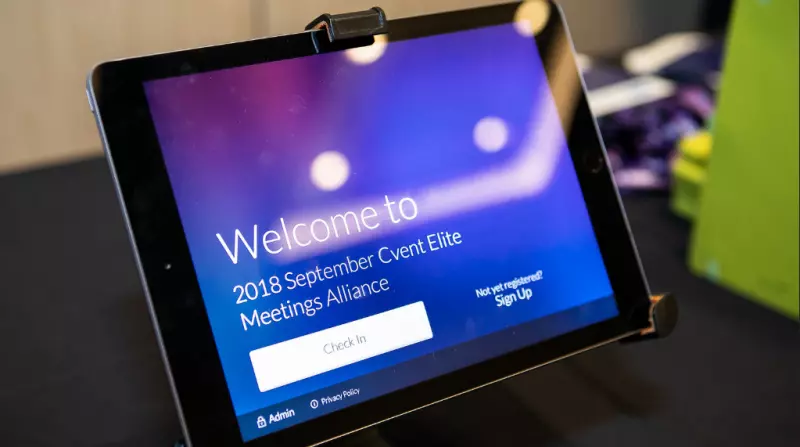Events are a powerful marketing tool that can drive organizational success and forge one-on-one connections with your audience. Whether you're planning an in-person, virtual, or hybrid event, effective promotion is key to its success. In this comprehensive event marketing guide, we'll explore what event marketing is, how to create a winning strategy, and how to improve your events program.
What is Event Marketing?
Event marketing can take on different meanings, but in essence, it refers to the use of marketing tactics to promote events or the strategic use of events as a marketing tactic. Events represent a significant portion of many organizations' marketing budgets, and for good reason. In-person and virtual experiences have the power to create lasting impressions and foster meaningful connections.
 Caption: Events have the power to create memorable experiences and forge one-on-one connections.
Caption: Events have the power to create memorable experiences and forge one-on-one connections.
Types of Event Marketing
Event marketing strategies can vary depending on your goals and the nature of your event. Some common types of event marketing include email marketing, event-based strategies, event websites, advertising, social media marketing, and search engine optimization. Each strategy has its own unique benefits and considerations.
The Event Marketing Process
Before diving into event marketing, it's important to define your goals, budget, and desired outcomes. Determine how your event can help your organization achieve its objectives, whether it's adding to the sales pipeline, improving morale, promoting a product, or enhancing brand awareness. By identifying your goals and objectives, you can plan your promotion and event strategy accordingly. Be mindful of the timing and context in which you promote your event, as external factors can impact its success.
Event Marketing Plan
Promotion, Promotion, Promotion
Your event deserves a killer promotion plan. Start building your marketing plan right from the beginning, alongside your event planning process. Without a robust promotion strategy, your event may go unnoticed. To help you get started, here's a basic event marketing plan template:
- Know Your Event: Understand the purpose, theme, and key details of your event.
- Event Basics: Define the event name, type, tagline, and color scheme.
- Event Website: Create a compelling event website that contains key information and convinces attendees to register.
 Caption: An engaging event website is essential for attracting and convincing potential attendees.
Caption: An engaging event website is essential for attracting and convincing potential attendees.
Create an Email Marketing Plan That Engages
Email marketing is a crucial part of any promotion plan. However, it's important not to overdo it. Avoid spamming your attendees and instead focus on creating attention-grabbing subject lines and targeted campaigns. Here are some top tips for effective event email marketing:
- Use email marketing software to manage and segment your contact lists.
- Segment your email audiences to deliver relevant content.
- Ensure consistency between your email content and event website.
- Maximize registration and engagement by automating updates and sending personalized emails.
- Review reporting to analyze open and click-through rates and uncover marketing opportunities.
Leverage the Power of Social Media
Social media is a powerful, free tool for event promotion. It allows you to engage with your audience and build buzz around your event. However, it's important to choose the right platforms based on your target demographic. Here are some key recommendations for using social media to promote your event:
- Hashtags: Create a unique event hashtag and encourage attendees to use it in their posts.
- Contests: Run social media contests to increase engagement and generate buzz.
- Ambassadors: Identify social media ambassadors who can help promote your event to their followers.
- Consistent Posting: Regularly post creative and personable content that resonates with your followers.
- Interaction with Followers: Engage with your audience by responding to questions and comments in a timely manner.
 Caption: Leveraging social media can help create buzz and engage potential attendees.
Caption: Leveraging social media can help create buzz and engage potential attendees.
Paid Digital Promotion
While free promotion methods are effective, paid promotion can also yield great results. If your event has a larger budget and aims to reach a wider audience, consider investing in paid ads. Determine your budget, desired impressions, and the type of promotion that aligns with your event goals. Don't forget to explore other forms of promotion like direct mail and calls.
Don't Forget About Sponsors
Sponsors can play a crucial role in supporting your event and defraying costs. Develop clear sponsorship packages that showcase the benefits of partnering with your event. Be flexible and open to different sponsorship opportunities, as any sponsor can contribute to the success of your event.
Defining Event Marketing Success
Measuring the success of event marketing involves various metrics that align with your company's overall goals. These metrics include financial results, event attendance, lead generation, overall awareness, post-event analysis, and more. By defining your event marketing objectives and aligning them with your company's objectives, you can track the impact of your events and calculate their return on investment (ROI).
Event ROI
Calculating event ROI involves a comprehensive analysis of both costs and benefits. Direct costs, indirect costs, and opportunity costs should be considered to understand the true cost of running an event. On the flip side, benefits such as direct revenue, attributed revenue, event branding, knowledge exchange, and ticketing and pricing strategies contribute to the overall value of an event. By evaluating these factors, you can assess the ROI of your event and make informed decisions for future events.
Event Technology and Online Event Marketing Software
Event marketing software can streamline and enhance your event marketing efforts. Look for a comprehensive event management platform that allows you to create customized and automated emails, track attendee data, and measure the success of your marketing campaigns. Having all your event data in one place provides better visibility and enables data-driven decision-making.
Event Marketing Best Practices
To maximize the impact of your event marketing, keep these best practices in mind:
- Understand the goals and budget of your event.
- Create a comprehensive plan to meet your event goals.
- Set measurable objectives to track your success.
- Schedule promotions in advance based on important event dates.
- Utilize discounts and sponsorships to increase attendance.
- Leverage event marketing software to streamline manual tasks and improve efficiency.
Virtual Event Marketing
In addition to traditional event marketing, virtual event marketing requires additional strategies. Virtual events have the advantage of eliminating travel barriers and reducing costs, potentially attracting a larger audience. However, effective marketing is still essential. Social media promotion, partnerships with sponsors and partners, and informative registration websites are key for virtual events. Having the right virtual event platform in place is also crucial for a seamless virtual or hybrid event experience.
Event Marketing is Essential
Event marketing plays a vital role in driving the success of your events. Whether you're planning an in-person, virtual, or hybrid event, effective promotion is crucial to attract attendees and achieve your event goals. By leveraging event marketing software and following best practices, you can create memorable experiences, forge connections, and achieve event marketing success.
Looking for more resources and insights on event marketing? Check out our eBook, "The New Event Marketing Opportunity," for valuable tips and strategies for event marketers in the evolving hybrid world.

















